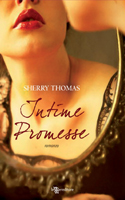Bantam
March 25, 2008
Mass Market Paperback
ISBN-13: 9780440244318
ISBN-10: 0440244315
Order Ebook:
Private Arrangements
Read an Excerpt »
Order the Book »
Read the Reviews »
Go Behind the Scenes »
International Editions »
"Ravishingly sinful, intelligent and addictive. An amazing debut."
— Eloisa James, New York Times bestselling author
"Enchanting...An extraordinary, unputdownable love story."
— Jane Feather, New York Times bestselling author
"A love story of remarkable depth...Entrancing from start to finish."
— Mary Balogh, New York Times bestselling author
To all of London society, Lord and Lady Tremaine had the ideal arrangement: a marriage based on civility, courteousness, freedom—and living on separate continents.
But once upon a time, things were quite different for the Tremaines…When Gigi Rowland first laid eyes on Camden Saybrook, Lord Tremaine, the attraction was immediate and overwhelming: she simply had to have him. But what began in a spark of passion ended in betrayal the morning after their wedding—and Gigi wants to be free to marry again. Now Camden has returned from America with an outrageous demand—an heir—in exchange for Gigi’s freedom.
Gigi's decision will have consequences she never imagined, as secrets are exposed, desire is rekindled—and one of London’s most admired couples must either fall in love all over again…or let each other go forever.
Share:

Watch the Trailer
The Story about the Story
The following account first appeared at Dear Author, as part of the weekly "First Sale" feature, which might explain the rare first-person POV narrative. :-)
Love in the Ruins of Home Improvement
In a way, PRIVATE ARRANGEMENTS is my first story. It started all the way back in 1998, when I was a young, overwhelmed stay-at-home mother. One day, during my son's nap time, I read a new book by an old favorite author. I hated the book—it was beyond stupid. And the thought popped into my head that surely I could write a better book than that.
I became excited about the idea. I did have a college degree, but it was in one of those useless fields (economics, pah) that needed a graduate degree, preferably a Ph.D., to be of any cash flow value. The costs of my working outside the home—childcare, professional wardrobe, additional taxes—almost negated the economic benefits of doing so. But but but, if I could write romance novels sitting at home and make a little money doing it, it would be the perfect solution for me.
(Yeah, you read it right. I would fall in love with writing later but I'd started solely for monetary reasons. And no, I'd never had any prior fiction writing instruction or experience. Ah, the naive arrogance of the young.)
Now I had the gleam in my eye, but no concrete story. All the historical romances I'd read up to that point always either had an epic storyline, à la Rosemary Rogers, or some sort of murder, intrigue, or suspense. And plotting, I knew from the very beginning, was not my strong suit.
Then came that fortuitous moment in a Barnes & Noble. I picked up my first Susan Johnson book, and not just any Susan Johnson book, but WICKED, which, after the initial setup, was almost entirely sex. I love the book and I absolutely adored the fact that it had very little external plot. I could do that, I thought.
(I was so influenced by Susan Johnson in those early days that the first version of PRIVATE ARRANGEMENTS had an onscreen love scene between the hero and another woman—which was often the way we were introduced to a Susan Johnson hero.)
Not sure at what precise moment the bones of PA coalesced out of the chaos: that of a young woman whose marriage was doomed when she decided to have the young man she adored by means fair or foul. But I do remember that I wanted something different. I'd read a lot of historical romances in which the hero believed the heroine to have done something awful when she was as innocent as a daisy. What if she really did do something beyond the pale, then what would happen?
I finished writing that first version in the summer of 2000. Right away I consulted Publisher's Marketplace and sent off queries to some of NYC's finest literary representatives. Nobody wanted it, though one agent did very nicely call me and tell me that I had talent, but she wouldn't be able to sell the story as it was.
Fast forward to August of 2005, not the most spirited time in my long slog toward publication. I'd finished several more manuscripts and grown gray and sere waiting for The Call. Okay, maybe not quite. But the failure of my epic martial arts action adventure love story to win agents and influence editors did deal a heavy blow. I was still writing, having gone back to my romance roots and started a couple of new manuscripts, but in each of those new manuscripts I'd also come to a point where I wasn't sure what to do anymore.
That was when the home improvement started. We had relatives coming from overseas to visit. Our house was twenty years old and criminally neglected during our six-year tenure, and we couldn't possibly welcome esteemed guests with the abode in such obvious dilapidation.
To this day I don't know why we decided to paint the walls and change the floors ourselves. I'm handy enough, but there was just so much work, I was in a state of fatigue-induced despair, certain the work would never, ever be finished. In the midst of all this, trying to make room in the mess, I moved some papers and came across a hard copy of PRIVATE ARRANGEMENTS, which had been quietly feeding bookworms in a cardboard box for five years—incomplete on top of it, because often when I needed to print something, I'd pull a page out and use the back side of the paper.
(I owe DA favorite Kathleen O'Reilly a big thank-you here. I run an entirely paperless operation; I never, ever print out any of my manuscripts. Through various computer upheavals, I'd lost the e-files for PA. And the hard copy existed solely because Kathleen, who still lived in Austin in 2000, had kindly read it for a critique.)
I thought I'd turned my back on PA forever. I certainly had no intention of ever resurrecting a crappy first manuscript. But for some reason, on that crazy-busy, dead-tired day, I sat down on the carpet, read a few pages, and then a few more. Something struck me. Awkward execution aside, I was still as taken as ever with the fundamental story itself, that of a terrible decision and its aftermath.
I started banging out a new version even before we finished the home improvement (the colors we'd picked for the walls, as it turned out, were so awesomely ugly that we had to have it professionally repainted a year later). I chucked everything from the original manuscript, except the names of the characters and their basic backgrounds, moved the time period sixty years to the turn-of-the-century, and re-built the story from scratch. No more long road trip through Austria that was nothing but me scratching my "Sound of Music" itch. No more coincidental reunion of the hero and heroine—this time she files for divorce to marry a nice younger man, and he descends in a fell swoop and sneers "not so fast, bitch." Well, you get my drift.
As I worked on the new version, I geared up for my third round of agent search. This time I wanted a newer, hungrier agent. Kristin Nelson had been on my radar for a while, because she represents SF romance—which I've always wanted to write but which a lot of romance agents don't do. Then I discovered Miss Snark. And Miss Snark couldn't say enough good things about Ms. Nelson. From a practical standpoint, not only did Kristin take e-queries—less postage, woot!—but she did not require a synopsis at any stage of the query process. For someone who hates synopsis writing with the passion of a thousand suns, that really clinched the deal for me. She was my dream agent, and I would not query anyone else until she'd turned me down.
I sent off my e-query to Kristin on April 19, 2006. The book wasn't yet complete at that point. That's usually a no-no, but I needed a sense of urgency to finish the damn story: I'd hit a slump, and I was due back in grad school in July—my second child would start kindergarten in the fall and I figured it was high time for me to get a useful degree and contribute to the family coffer.
(A big heartfelt smooch to my husband, who never, ever, not once asked me to get off my butt and do something more remunerative in the eight years leading up to that first contract, not even when the economy was scary and he really would have appreciated the security of a second income.)
The request for a partial came three weeks later. I don't know when the full request came—accidentally deleted that e-mail in all the excitement—but I remember that for once my steady nerves failed me and I had my husband read the e-mail for me to see whether it was a full request or a "Thank you but no thank you."
It was a full request. And the manuscript was still unfinished. I went into a writing frenzy.
On Monday June 19, I sent off the full manuscript—as an e-mail attachment, per Kristin's instruction. I settled down to wait that six to eight weeks it usually took to hear back on a full—and finally composed the official good-bye letter to my former agent, from whom I hadn't heard in two-and-half years.
The certified termination letter went out on Friday June 23. The next day, I took the elder kidlet to Lowe's to buy some timber. I'd been reading about Square Foot Gardening, which required some box-building. And as brown as my thumb was, I was enthused enough to give it a try.
My cell phone rang just as I arrived home. It was Kristin Nelson, who'd read and loved the story, calling to offer representation. I think I blurted out, "Omigod, I just hauled home a load of timber."
She laughed and asked if it was some Texas thing. I probably bleated some more nonsense before we got around to the important things. She sent an editorial letter. I revised the manuscript and sent it back just before I started my classes on July 10th.
Kristin sent the manuscript out on submission on Tuesday July 11. I think my stars were aligned for that month, for two days later we had our first firm offer. This led to an accelerated process whereby Kristin called all the other editors who had the manuscript and told them to read fast and get back to her by the following Monday.
She e-mailed me the next Monday—she'd called but I abandoned my cell phone home most days—and let me know that there were five houses interested in PA. The next day I took my cell phone to school, set it to vibrate, and left it on my desk. As soon as it buzzed, I rushed out of the classroom.
We had a very strong pre-empt from Bantam. Kristin was thrilled. She decided to ask for some more dough. I was still in a daze from when the first offer came. I went home and talked to my husband. Over the years, I'd always hoped that I'd one day get the Madeline Hunter treatment: She was brought out beautifully by a skillful and supportive publisher. And lo and behold, the publisher name I see on the spine of my copy of By Arrangement that I held up to show Dear Hubby was none other than—you guessed it—Bantam. It was meant to be.
Next morning Kristin called. Bantam had agreed to her terms and we had ourselves a deal. Since then, I have most definitely received the Madeline Hunter treatment, from the beautiful covers, to the lavish ARCs distributed at RWA Dallas, to the bookseller outreach on behalf of PRIVATE ARRANGEMENTS.
This piece is written before PA releases, so I don't know yet how well it will do in the marketplace. But what a ride it has been. I will always be grateful to Kristin and Caitlin Alexander, my editor and fairy godmother at Bantam, for taking such good care of me and I hope to work with them, in joy and pleasure, for many years to come.
(The timber, however, is still languishing in the garage.)
Reviews
"Superb...will win readers over with its elegant writing, exceptional characterization...and exquisitely romantic
love story."
— Chicago Tribune
"Sherry Thomas' captivating debut novel will leave readers breathless. Intelligent, witty, sexy and peopled with wonderful characters (heck, I even liked sweet, vague Freddy!) and sharp, clever dialogue, PRIVATE ARRANGEMENTS is everything astute readers want in their historical romances."
— TheRomanceReader.com
"Thomas makes a dazzling debut with a beautifully written, sizzling, captivating love story...Her compelling tale of love betrayed and then reborn will make you sigh with pleasure."
— Romantic Times, 4 1/2-star review
"Deft plotting and sparkling characters mark this superior debut historical...Thomas propels the plot forward with revealing repartee and gives the leads real nuance. Intelligent and forthright with honorable hidden qualities, Lady Tremaine makes an exceptional heroine, and her deceptions are believably attributed to a desire for self-preservation in a sexist society. The results are steamy and smart."
— Starred Review, Publishers Weekly
"Thomas tantalizes readers as she skillfully peels away the layers of Cam and Gigi's relationship in an enchanting, thought-provoking story of love lost and ultimately reclaimed. Lively banter, electric sexual tension, and an unusual premise make this stunning debut all the more refreshing."
— Starred Review, Library Journal
"PRIVATE ARRANGEMENTS is historical romance the way I love it."
— Desert Isle Keeper Review, AllAboutRomance.com
"It was big, dramatic, and romantic."
— Jane, DearAuthor.com
"Maybe I'm giving it such a high grade because it's making me think about these things so much and deep down that's what I want, a book that truly makes me analyze what's good and bad about it but still gives a good HEA at the end. As well as put in my keeper shelf to reread and think more on in the future."
— Lawson, The Good, the Bad, the Unread
"This is an excellent story and one you need to pick up and experience for yourself."
— RomanceJunkies.com
"Sherry Thomas has woven a wonderful tale of regrets and secret desires. Her characters are realistic and complex. Private Arrangements is definitely worth reading."
— NightOwlRomance.com
"The actual writing is wonderful. The dialogue is fantastic. The use of sexual tension is precise. It isn't used to make the book "hot" until the characters are ready for it. It isn't rushed."
— Alicia, The Good, the Bad, the Unread
"There is so much to enjoy about the whole that I look back on my reading experience with a great deal of pleasure and am anticipating what you'll offer us next."
— Jayne, DearAuthor.com
"I know your debut book, PRIVATE ARRANGEMENTS, has already been reviewed well here and elsewhere, so I don't know if I can add anything new to the chorus, but this book made such a positive impression on me, especially in your crafting of the heroine, Gigi, that I wanted to review it simply to articulate my appreciation for such supple and nuanced characterizations."
— Janet, DearAuthor.com
"PRIVATE ARRANGEMENTS is captivating, a rich and luscious romantic treat. The heart of the novel—Thomas' beautifully created dialogue—is striking in the way it woos the reader with fresh, crisp exchanges. And the soul of PRIVATE ARRANGEMENTS is Thomas' skillfully conveyed internal dialogue—the thoughts of the characters that help us understand their motivations, even as they offer their unique perspectives on the world around them..."
— Michelle Buonfiglio, Romance B(u)y the Book
"Once readers meet Gigi and Camden, they won't want to put this book down.."
— Romance Reviews Today
"Son histoire, son style, la construction du livre, tout m'a enchantée."
— Blue Moon (Sherry's first French review!)
"PRIVATE ARRANGEMENTS is definitely a superior historical romance."
— Curled up with a Good Book
"PRIVATE ARRANGEMENTS è una bellissima storia d'amore perduto e ritrovato, che fa ben sperare per il futuro di questo genere. La migliore che ho letto quest'anno. Spero di poterla vedere presto tradotta anche in Italiano. Inutile dire che il prossimo romanzo della Thomas, Delicious, è già nella mia lista dei desideri!"
— Biblioteca Romantica (Sherry's first Italian review!)
"This is a deeply involving story."
— Coffee Time Romance
"I know we're only four months into 2008, but I can say with some certainty that PRIVATE ARRANGEMENTS is the best romance of the year."
— The Mystic Castle
Excerpt
Chapter One
London
8 May 1893

Only one kind of marriage ever bore Society's stamp of approval.
Happy marriages were considered vulgar, as matrimonial felicity rarely kept longer than a well-boiled pudding. Unhappy marriages were, of course, even more vulgar, on a par with Frau Von Teese's special contraption that spanked forty bottoms at once: unspeakable, for half of the upper crust had experienced it firsthand.
No, the only kind of marriage that held up to life's vicissitudes was the courteous marriage. And it was widely recognized that Lord and Lady Tremaine had the most courteous marriage of them all.
In the ten years since their wedding, neither of them had ever uttered an unkind word about the other, not to parents, siblings, bosom friends, or strangers. Moreover, as their servants could attest, they never had spats, big or small; never embarrassed each other; never, in fact, disagreed on anything at all.
However, every year, some cheeky debutante fresh from the schoolroom would point out—as if it wasn't common knowledge—that Lord and Lady Tremaine lived on separate continents and had not been seen together since the day after their wedding.
Her elders would shake their heads. Foolish young girl. Wait ‘til she heard about her beau's piece on the side. Or fell out of love with the man she married. Then she'd understand what a wonderful arrangement the Tremaines had: civility, distance, and freedom from the very beginning, unencumbered by tiresome emotions. Indeed, it was the most perfect marriage.
Therefore, when Lady Tremaine filed for divorce on grounds of Lord Tremaine's adultery and desertion, chins collided with dinner plates throughout London's most pedigreed dining rooms.
Ten days later, as news circulated of Lord Tremaine's arrival on English soil for the first time in a decade, the same falling jaws dented many an expensive carpet from the heart of Persia.
The story of what happened next spread faster than a well-fed gut. It went something tantalizingly like this: A summon came at the Tremaine townhouse on Park Lane. Goodman, Lady Tremaine's faithful butler, answered the bell. On the other side of the door stood a stranger, one of the most remarkable-looking gentlemen Goodman had ever come across, tall, handsome, powerfully built, an imposing presence.
"Good afternoon, sir," Goodman said placidly. A representative of the Marchioness of Tremaine, however impressed, neither gawked nor gushed.
He expected to be offered a calling card and a reason for the call. Instead he was handed the gentleman's headgear. Startled, he let go of his hold on the doorknob and took the satin-trimmed top hat. In that instant, the man walked past him into the vestibule. Without a backward glance or an explanation for this act of intrusion, he began pulling off his gloves.
"Sir," Goodman huffed. "You do not have permission from the lady of the house to enter."
The man turned around and shot Goodman a glance that, to the butler's shame, made him want to curl up and whimper. "Is this not the Tremaine residence?"
"It is, sir." The reiteration of "sir" escaped Goodman, though he hadn't intended for it to happen.
"Then kindly inform me, since when does the master of the house require permission from the lady to enter into his own domain?" The man held his gloves together in his right hand and slapped them quietly against the palm of his left hand, as if toying with a riding crop.

Goodman didn't understand. His employer was the Queen Elizabeth of her time: one mistress and no master. Then the horror dawned. The man before him was the Marquis of Tremaine, her long-absent, good-as-dead husband and heir to the Duke of Fairford.
"I do beg your pardon, sir." Goodman held on to his professional calm and took Lord Tremaine's gloves, though he was suddenly perspiring. "We have had no notice of your arrival. I shall have your chambers prepared immediately. May I offer you some refreshment in the meanwhile?"
"You may. And you may see to the unloading of my luggage," said Lord Tremaine. "Is Lady Tremaine at home?"
Goodman could not detect any unusual inflection in Lord Tremaine's tone. It was as if he had simply come in from an afternoon snooze at his club. After ten years! "Lady Tremaine is taking a constitutional in the park, sir."
Lord Tremaine nodded. "Very good."
Goodman instinctively trotted after him, the way he'd trail a feral beast if it happened to have made it past the front door. It was only half a minute later, as Lord Tremaine turned about and raised a brow, that Goodman realized he had already been dismissed.
Something about his wife's townhouse disturbed Lord Tremaine.
It was surprisingly elegant. He had half expected to see the kind of interior he had become accustomed to in the houses of his neighbors on lower Fifth Avenue: grandiose, gilded, aiming only to recall the last days of Versailles.
She had a few chairs from that era, but they had held their share of velvet-clad bottoms and looked comfortable, rather than luxurious. Neither did he encounter the heavy sideboards and unchecked proliferation of bric-a-brac that were firmly associated, in his mind, with English homes.
If anything, her residence bore an uncanny resemblance to a certain villa in Turin, at the foot of the Italian Alps, in which he had spent a few happy weeks during his youth—a house with wallpapers of soft antique gold and muted aquamarine, faience pots of orchids atop slender wrought-iron stands, and durable, well-made furniture from the previous century.
During an entire boyhood of decamping from one domicile to the next, the villa had been the only place, other than his grandfather's estate, where he'd felt at home. He had loved its brightness, its uncluttered comfort, and its abundance of indoor plants, their breath moist and herbaceous.
He was inclined to dismiss the echoing similarity between the two houses as a coincidence until his attention shifted to the paintings that adorned the walls of her drawing room. Between the Ruben, the Titian, and the ancestral portraits that occupied disproportionate acreage on English walls, she had hung pieces by the very same modern artists whose works he displayed in his own townhouse in Manhattan: Sisley, Morisot, Cassatt, and Monet, whose output had been infamously likened to unfinished wallpaper.
His pulse quickened in alarm. Her dining room featured more Monets and two Degas. Her gallery made it look as though she had bought an entire Impressionist exhibit: Renoir, Cezanne, Seurat, and artists no one had ever heard of outside the most gossipy circles of the Parisian art world.
He stopped midway down the gallery, suddenly unable to go on. She had furnished this house to be a fantasy-come-true for the boy he had been when he married her, the boy who must have mentioned, during their long hours of rapt conversation, something of his preference for understated houses and his love of modern art.
He remembered her spellbound concentration, her soft questions, her burning interest in everything about him.

Was the divorce but a new ruse then? A cleverly sprung trap to re-ensnare him when all else had failed? Would he find her perfumed and naked on his bed when he threw open the door to his bedchamber?
He located the master's apartment and threw open the door.
There was no her, naked or otherwise, on his bed.
There was no bed.
And nothing else either. The bedchamber was as vast and empty as the American West.
The carpet no longer showed depressed spots where chair legs and bedposts had once stood. The walls betrayed no telltale rectangles of recently removed pictures. Thick layers of dust had settled on floor and window sills. The room had stood vacant for years.
For no reason at all, he felt as if the breath had been kicked out of his lungs. The sitting room of the master's apartment was sparkling clean and fully equipped—tuft-backed reading chairs, shelves laden with well-read books wrinkled at the spines, a writing desk freshly supplied with ink and paper, even a pot of amaranth in bloom. It made the void of the bedchamber all the more pointed, a barbed symbol.
The house might have been, once upon a time, designed with the single-minded goal of luring him back. But that was a different decade—another age altogether. He had since been eviscerated from her existence.
He was still standing in the doorway, staring into the empty bedchamber when the butler arrived, two footmen and a large portmanteau in tow. The nothingness of the chamber made the butler blush an extraordinary pink. "It will take us only an hour, sir, to air the chamber and restore the furnishing."
He almost told the butler not to bestir himself, to let the bedchamber remain stark and barren. But that would have said too much. So he only nodded. "Excellent."
Copyright © 2009 by Sherry Thomas. Excerpted by permission of Bantam, a division of Random House, Inc. All rights reserved. No part of this excerpt may be reproduced or reprinted without permission in writing from the publisher.
International Editions
 Spain
SpainBook Club Version
 Thailand
Thailand Vietnam
Vietnam































